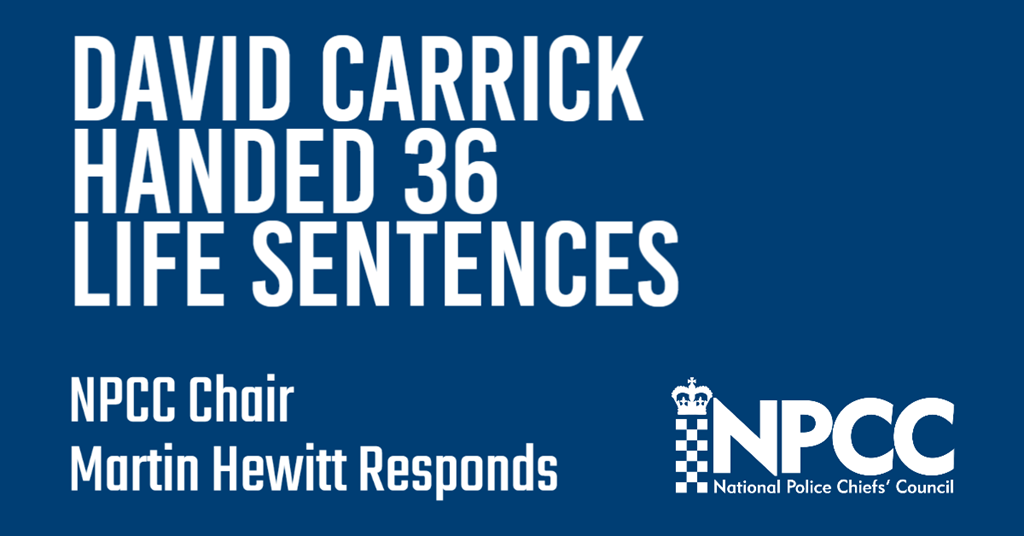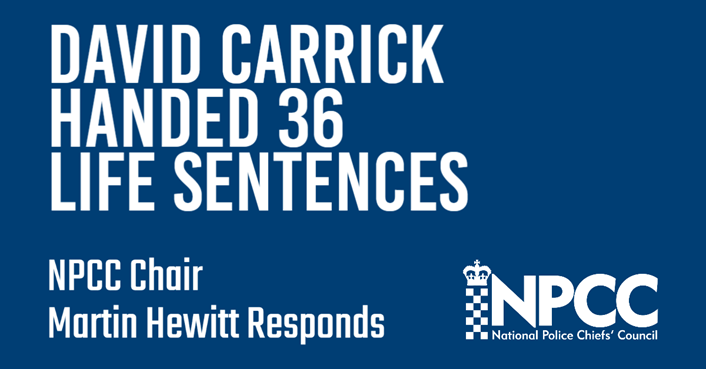
07 Feb 2023
NPCC responds to sentencing of David Carrick
David Carrick has been sentenced to life imprisonment and ordered to serve a minimum of 30 years behind bars.
He pleaded guilty to 49 offences against 12 women including 24 counts of rape and further counts of controlling and coercive behaviour, sexual assault and false imprisonment.
He was sacked from the Metropolitan Police Service last month.
Carrick was sentenced at Southwark Crown Court on Tuesday, 7 February following a two day hearing.
National Police Chiefs' Council Chair Martin Hewitt said:
“It is yet another dark week for policing. But it’s nothing compared to the decades of pain and trauma suffered by the victims of David Carrick and others who should never have been in uniform. This is a week for them, for them to be heard and for their courage and bravery to be commended.
“Police chiefs have been strengthening their misconduct processes, addressing cultural problems and increasing action against violent men over the past two years.
“In the coming months, the public should expect to see more investigations launched, more sanctions, more sackings and more charges. Some of these will contain more shocking detail. This will be painful, but it is necessary as we root abusers and corrupt individuals out of policing and eliminate misogynistic, racist and discriminatory behaviour.
“I know my words today won’t rebuild the trust that has been lost; that will only be rebuilt by the public seeing the results of our action in the coming months and years.”
Further information:
Action being taken by all police forces should result in:
- More interrogation of intelligence about our own staff and stronger investigations;
- More internal reporting of concerns;
- More dismissals and sanctions;
- Higher satisfaction from victims or those who raise concerns;
- Better investigations of violence against women and girls;
- More assurance from independent bodies of the strength of our systems and processes and that we are following high standards;
- More confidence from our staff that toxic behaviour will be called out and dealt with.
Police action includes:
- The NPCC and College of Policing VAWG framework launched in December 2021 sets out action required from every police force to make women and girls safer. Every force has action plans prioritising violence against women and girls in their force, strengthening reporting routes and investigation of concerns as well as reviewing allegations of sexual misconduct or domestic abuse against officers.
- All police forces have communicated to their staff that there is no place for sexism, misogyny or sexualised behaviour as well as other forms of discrimination or misconduct. They have reiterated the professional responsibility on each individual to call out behaviour that betrays our professional standards and strengthened reporting routes and support for those raising concerns.
- Ensuring professional standards departments have a good working knowledge of current criminal investigation practice, access to expertise from rape and sexual assault investigators and effective joint working when misconduct and criminal investigations are being conducted by different teams. Following an NPCC and College learning review published in October 2022.
- Addressing failings in systems, processes and decision-making identified by His Majesty’s Inspectorate of Constabulary and Fire and Rescue Services (HMICFRS) review on vetting and misconduct; issues uncovered in a super-complaint about police perpetrated domestic abuse by the Centre for Women’s Justice: and taking learning from Dame Louise Casey’s review of the Met Police.
- NPCC has called on all chief constables to take every possible step to root out those who do not uphold our standards including:
- Chairing accelerated hearings wherever the grounds are met (Home Office data showed that in 95% of these hearings, the officer was sacked by their chief constable, or would have been if they were still serving when the hearing happened.)
- Making submissions to the chairs of those independent panels, wherever appropriate, so that sanctions always meet the gravity of an offence.
- Seeking judicial review of decisions where appropriate.
Contact information
Communications office
By phone: 0800 538 5058
By email: press.office@npcc.police.uk

